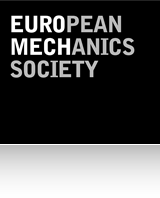Statutes
EUROMECH Statutes: Key Highlights
The European Mechanics Society e.V. (EUROMECH) is a non-profit registered association based in Aachen, Germany (§1).
Membership: The association offers membership in three categories: individual, joint (for members of affiliated organizations meeting individual member qualifications), and institutional (for interested institutions or groups). Membership grants voting rights and regular updates on activities (§4). To become a member, an application is submitted to the Secretary General or by participating in an organized event, with the fee included in the participation cost (§4.3). Members gain access to all scientific events (§5.1) and are obligated to pay annual fees (§5.2). Membership can end through expiration, death, withdrawal (via written notice to the Secretary General), or exclusion by the Council with a three-quarters majority for serious reasons (§6).
Governing Organs: The association's affairs are managed through its organs: the General Assembly (§8), the Board of Officers (§9), and the Council (§10) (§7).
General Assembly: Convenes annually and is responsible for electing the Board and Council members and auditors, receiving reports and discharging the Board, amending the Articles of Association, setting membership fees, and appointing honorary members (§8a). Each member has voting rights, with institutional members represented by a delegate (§8.4).
Board of Officers: The association's managing body, comprising the President, Vice President (the immediate past President), Secretary General, and Treasurer (§9.1). Its responsibilities include organizing the association's work and proposing activities and elections to the General Assembly (§9.2). The Executive Committee, formed by the Board members, represents the association legally and manages its affairs (§9.3).
Council: Includes the Board members, six additional elected members, and an observer from IUTAM (§10.1). It handles general matters not assigned to the General Assembly, such as adopting regulations, determining the time and place of scientific meetings, approving General Assembly minutes, electing representatives to cooperating institutions, and excluding members (§10.4). The Council is chaired by the President (§10.4).
Scientific Advisory Board: Advises on strategic issues and proposes candidates for the Council (§11).
Affiliated Organizations: Organizations representing a significant number of scientists within the European mechanics community can be recognized as affiliated organizations by the Council, fostering collaboration on matters of common interest (§13).
For complete details regarding the statutes, please refer to the official document available in the relevant files.
